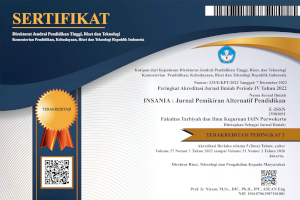PENGEMBANGAN BAHAN AJAR BERBASIS KONTEKS SOSIOKULTURAL KOTA CIREBON DALAM PEMAHAMAN MATEMATIKA SISWA
DOI:
https://doi.org/10.24090/insania.v24i1.1798Abstract
This study aims to produce educational materials based on the socio-cultural context of the city of Cirebon, which has a good and decent quality. The teaching materials can be used in the mathematical understanding of the students in MTs Riyadlul Ulum Bendungan. The type of learning material that is developed is a printed math module printed for class 7. The research method used is Research and Development which refers to the ADDIE development model. Where the development phases are: 1) Analysis, 2) Design, 3) Development, 4) Implementation, 5) Evaluation. The data collection techniques used in the research include; Sheets, questionnaires and Judge Expert tests. While qualitative and quantitative analyzes are used for data analysis. From the research results, the development of educational materials based on the socio-cultural context of the city of Cirebon in the understanding of mathematics students including a good category to be used in the process of learning mathematics. This, in line with the results of the students' answers to the teaching material, has developed quite well. In the results of limited tests and in-depth tests, the cutting of teaching materials takes up three aspects of evaluation (assessment of appearance, presentation of material and benefits). Thus also the results of the validation of the team of materials and media experts, that the developed teaching materials include categories worthy of being used in learning activities. then the teaching material, as a complement to teachers in teaching and can help students understand mathematics by promoting the local Cirebon of the wisdom of the cityDownloads
Downloads
Published
How to Cite
Issue
Section
License
Authors who publish with this journal agree to the following terms:
Authors retain copyright and grant the journal right of first publication with the work simultaneously licensed under a Creative CommonsAttribution-ShareAlike License that allows others to share the work with an acknowledgment of the work's authorship and initial publication in this journal.
Authors are able to enter into separate, additional contractual arrangements for the non-exclusive distribution of the journal's published version of the work (e.g., post it to an institutional repository or publish it in a book), with an acknowledgment of its initial publication in this journal.
Authors are permitted and encouraged to post their work online (e.g., in institutional repositories or on their website) prior to and during the submission process, as it can lead to productive exchanges, as well as earlier and greater citation of published work (See The Effect of Open Access).








